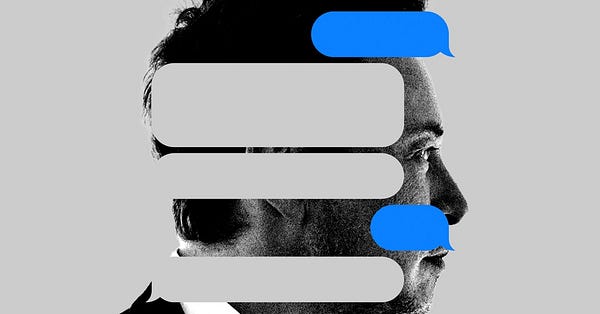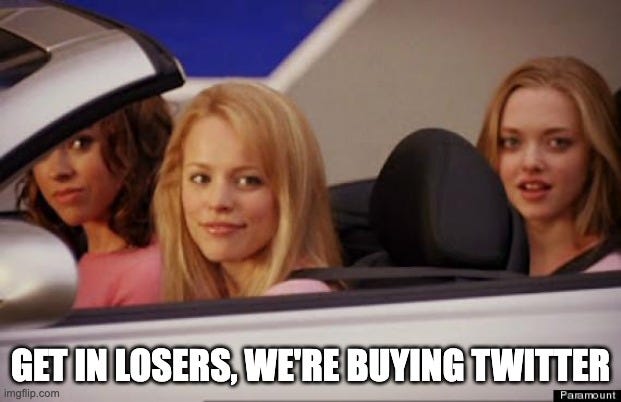On Elon Musk and NPCs
It's pumpkin spice heckle-Elon month. The most wonderful time of the year.
We should talk about Elon.
I’m tempted to declare October 2022 as “heckle-Elon-month.” He very much deserves it. Musk will be visiting the Delaware Chancery Court later this month, to explain to a judge that the contract he signed to purchase Twitter for $44B to get rid of all the bots should be invalidated because Twitter never told him about the bots. Or something. It could get pretty entertaining.
Last Friday, Elon unveiled Tesla’s prototype humanoid robot, “Optimus.” He insisted, "It'll be a fundamental transformation for civilization as we know it.” You can watch the video below. I’m not a roboticist, but… yeah, this is still a long way from being anything.
And yesterday, Musk decided it was time to end the war in Ukraine… via Twitter poll.
We’ve gotten accustomed to these antics from Musk. We’ve grown weary of them. People have started to collectively wonder whether the world’s richest man is fundamentally just a carnival barker.
I’ve begun to suspect that the key to understanding Musk’s behavior lies in a statement that he has made repeatedly, but hasn’t been examined seriously enough.
Elon Musk thinks we’re living in a simulation. He behaves as though this is an elaborate, sophisticated game, and that the vast majority of us are non-player characters (NPCs).
Since 2016, Musk has insisted that the probability of our world being a non-simulated reality is just “one in billions.” This is based on a thought experiment from philosopher Nick Bostrom, one of the founders of Longtermism: If you begin from the tech-accelerationist premise that the capacity of computer networks will endlessly increase, then it is easy to imagine a far-future where our computer networks have grown so vastly powerful that they could simulate the development of human civilization with the same ease as your laptop launching The Sims today. With limitless energy sources and limitless computing capacity, billions of simulated realities, indistinguishable from “base reality” might one day bloom. It then follows that the probability of this being the one non-simulation is infinitesimally small. [1/the total number of simulated realities across all time.]
The simulation thought-experiment seems intuitively more believable if you are living the life of Elon Musk. Musk is CEO of multiple companies. He has moved markets with his tweets. People have become paper millionaires just by investing in meme coins that he likes. His life has the narrative arc of the standard hero’s journey. His is an exceptional life, surrounded by fawning supporters that nod at his brilliant insights, challenged by opponents who he can vanquish through a mix of wit, charm, insight, and hard work. Elon Musk life follows the narrative arc of the hero’s journey.
The simulation thought-experiment is less appealing if you are just a normal person working a normal job. If you work an entry-level job at a Tesla assembly plant, you might wonder why the arc of your simulated existence hasn’t been a bit more, y’know, adventurous. (Sure, we might one day construct Matrix-style computer simulations where the inhabitants live a life of repetitious drudgery. That’s disappointing, albeit certainly possible.)
Of course, if you question the tech-accelerationist premise – if you believe that Moore’s Law is slowing down, and that the pace of technological change sometimes moves fast and other times slows down – then the whole thought experiment is rendered a bit silly. We might be living in a simulation, but there’s no way of knowing if we were, no reason to assume such capabilities are inevitable, and nothing meaningful to be done with such information. (Emily St John Mandel has a wonderful riff on this last point in her latest novel, Sea of Tranquility. I won’t say any more about it here to avoid spoilers.)
It’s somehow unsurprising that the simulation thought experiment comes from the same philosopher who is responsible for the most extreme variant of Longtermist thinking. The appeal of longtermism to tech billionaires like Musk is that it suggests his actions today will echo through the millennia. It is a moral philosophy that encourages him to ignore pedestrian concerns like workplace conditions at Tesla factories or global poverty so that he can instead spin elaborate fantasies about colonizing Mars. For strong Longtermists, most of the 8 billion people alive today are effectively NPCs. Their actions and personal welfare simply do not matter to the long term fate of humanity, according to Bostrom’s cold calculus.
And by the same token, the simulation thought-experiment can serve as a schematic that separates Musk and his billionaire pals from the rest of the planet’s inhabitants. Elon can approach every new field and new challenge as though he is the first to encounter it. Whether its purging bots and protecting speech on Twitter, inventing next-generation robotics, or international diplomacy, he behaves as though the people who have spent decades developing expertise in those areas do not matter, because they are NPCs.
This is the theme that surfaced in the text exchanges between Elon and his investor pals. Charlie Warzel sums it up nicely: “Just overconfident dudes winging it.”


It has been pretty clear for months that Musk has approached the Twitter acquisition as though nothing had been tried until and unless he or a close personal friend tried it themself. Musk decided that he could quintuple Twitter’s revenues, basically through sheer force of will and a bit of brainstorming. He announced multiple goals that were fundamentally at odds with each other (ban all bots! Make Twitter fun again, without all the harrassment! But leave up everything that doesn’t break the law!).
What’s clear in the Musk text exchanges is that his fellow tech elites thought it would inevitably work. They don’t come across as sophisticated investors who have analyzed the business model and identified innovative solutions that no one else could see. They’re mostly just spitballing. They didn’t have some bold plan for vertical integration that would make the platform more viable. They were just a bunch of bros piling into Elon’s cybertruck for a road trip to rescue the digital public square. (Get in losers, we’re buying Twitter!)
Twitter has thousands of employees who have worked on making the company effective and profitable for years. These are smart people (including a whole lot of Ph.D.s) who work hard and have spent a long time trying to tackle difficult problems. Somehow Elon and his billionaire buddies are convinced that they can solve it all over brunch, without even a cursory knowledge of what has been tried before.
It’s as though, from Elon-and-company’s perspective, all those employees are NPCs. Of course Elon can fix Twitter! He has all that… Elon-ness! And so Marc Andreessen pledges $250 Million via DM to help Elon buy Twitter “with no additional work required.” And Larry Ellison pledges “A billion … or whatever you recommend.” The Founders have arrived. This is just another quest line for them to conquer within the simulation.
The same brash overconfidence is on display in Elon’s foray into international relations. What, precisely, does Elon Musk believe he knows about warfare and/or diplomacy that all those military experts and diplomats do not?
Likewise, with the Optimus robot. Elon is not a roboticist. The Optimus demo impressed basically zero actual robotics engineers, because it was several steps behind the benchmark successes of existing companies in this area. Why should we hail Tesla’s autonomous robot project as a major breakthrough? Because Elon is behind it, and Elon is a real player in this game.

What I found most interesting about the Optimus demo was that it failed to have any impact on Tesla’s stock valuation. Elon’s superpower for over a decade has been the ability to convince journalists and investors that he was building the future. It seems that power is waning. The more we see of Elon’s antics, the more that halo of inevitability wears away.
We’re just a few weeks away from the Musk-Twitter trial getting underway in Delaware’s Chancery Court. It’s going to be a month filled with revelations like last week’s text messages. And I suspect the overarching public lesson will be just how un-special our tech elites actually are.
Elon Musk never had any special insights into how to improve Twitter. He was just a rich guy with an unhealthy level of self-confidence. He was able to raise billions from his peer network, not because they had any special insights either, but simply because they also had a ton of money and absurd self-confidence.
They’ve been operating as though they are the main characters in a video game, one in which everyone who don’t have their wealth and worldview just don’t matter. (And life is pretty easy once you are a billionaire — the difficulty mode is definitely set to “casual.”) The rest of us, from assembly workers and baristas to lawyers and politicians, are just NPCs, filling out the backdrop of their adventurous, simulated lives. A thing just hasn’t been tried until one of the real players has tried it.
This is fundamental reason why I think Elon Musk deserves the ridicule he is now receiving. It’s a way for the rest of us to send the message that we too are real.
Non-player characters in simulated worlds are much less adept at talking back.







I have long believed that the one real superpower a human can wield is a titanic ego. You can accomplish insane goals if you fully believe your own bullshit and never give up. Of course, being born wealthy is a huge leg up in what resources are available (obligatory reference to Trump here). The tech billionaires share a basic profile: clever disguised as brilliant, a knack for quickly scanning and retaining facts, utterly ruthless business men, and a massive ego. Competence you can charm, buy or take over if you need to get something done. The ego is the one indispensable thing, it's the difference between being Woz or Jobs. The only thing striking about Musk is that he holds no monopoly or even a significant market share in his businesses. There's no real foundation to the wealth of Musk, and that's the only interesting thing about him. It's literally all an act.
I had to recheck the definitions of psychopath and sociopath before I felt ready to respond.
I'd say he's overdue for a massive, cataclysmic failure to teach him some humility but unfortunately a lot of good people would be hurt in the process. So instead I just hope he eventually wanders off to another version of the simulation. I think there's a lot of other more deserving people who deserve attention.